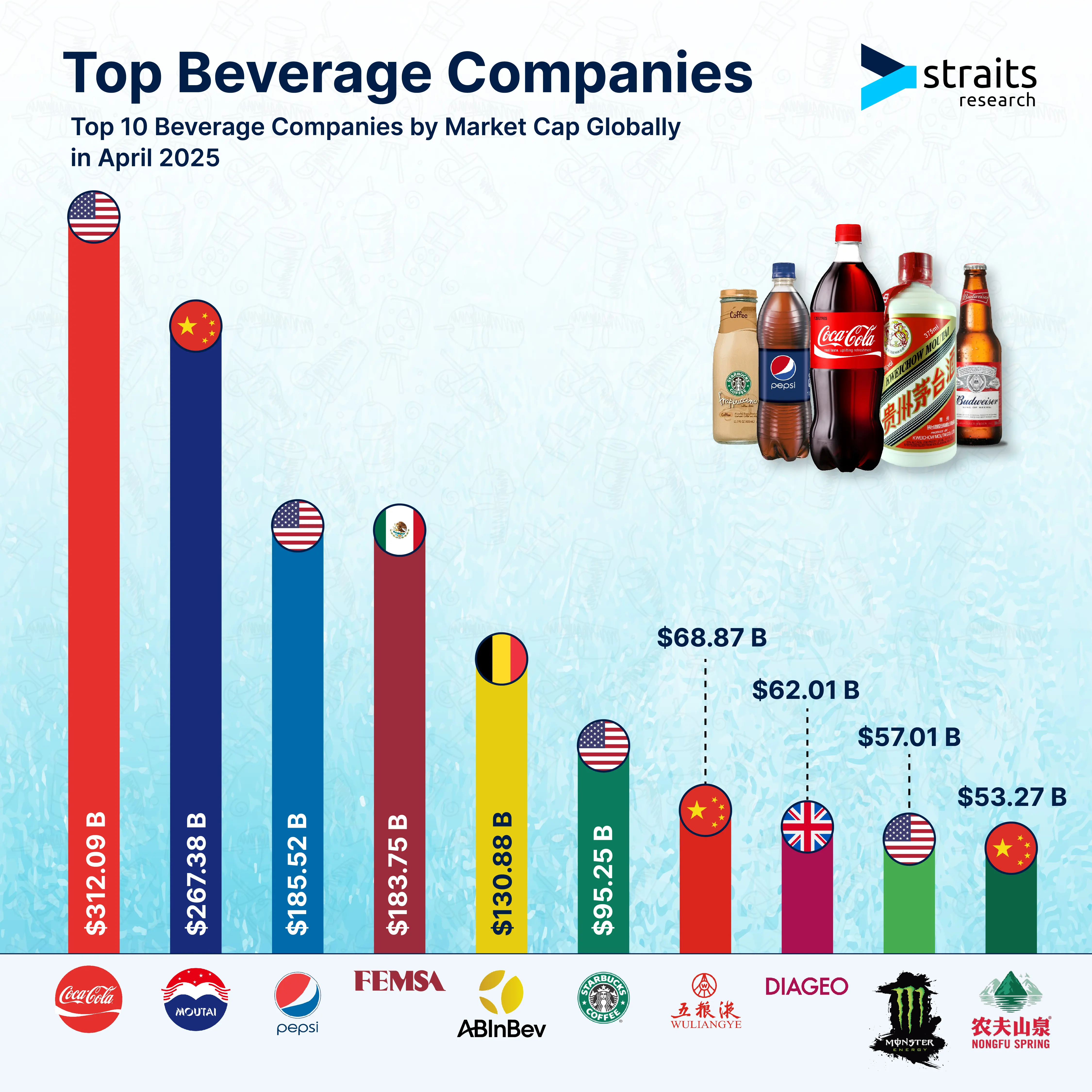Top 10 Beverage Companies by Market Capitalization Worldwide

Beverage companies play an integral role in modern life, not just by quenching thirst but by fueling economic growth, shaping consumer behaviour, and driving innovation in health and sustainability. Such companies, which together produce hundreds of billions of dollars in sales, are the foundation of the global drink industry. They also influence social and environmental agendas globally and create jobs and investment opportunities.
Industry reach
As of April 2025, the global beverage industry is dominated by a few key players that lead the market by market capitalization and consumer reach. At the top of the list is The Coca-Cola Company (USA) with a market cap of $312.09 billion, followed by Kweichow Moutai (China) at $267.38 billion, and PepsiCo (USA) at $185.52 billion. These three companies have a significant global presence, considerable brand equity, and an edge in market value.
Coca-Cola sells more than 2.2 billion beverage servings per day and has operations in more than 200 countries and territories. In 2023, the company sold 33.3 billion drink cases, up from 32.7 billion in 2022. Popular brands, including Coca-Cola, Sprite, and Fanta, are part of the Coca-Cola portfolio. About 20% of the company's value share comes from water, coffee and tea, and dairy and plant-based beverages, with sparkling soft drinks making up 50%. Its energy drink segment also holds a 35% value share.
China's Kweichow Moutai, a leader in the baijiu market, primarily thrives on its flagship product, Maotai, known as China's national spirit. The company reported 16% growth in 2024, but is predicting a more modest 9% growth in 2025. In addition to baijiu, Moutai has expanded into niche markets like ice cream and coffee with alcohol.
PepsiCo, another American player, reported $91.9 billion in total net revenue in 2024. Its beverage lineup includes iconic names like Pepsi-Cola, Gatorade, Mountain Dew, and Tropicana. Notably, Pepsi Max remains highly popular in the UK. Despite strong revenues, PepsiCo anticipates a 3% decline in core earnings per share in 2025, pointing to increased operational and market challenges.
With a market cap of $183.75 billion, Fomento Economico Mexicano (FEMSA) is ranked fourth in the world. The company is the biggest Coca-Cola bottler in the world through its subsidiary, Coca-Cola FEMSA. FEMSA reported a gross profit of £2.93 billion in 2024, with revenue up 12.8% to £32.18 billion.
Belgium's Anheuser-Busch InBev (AB InBev), with a market value of $130.88 billion, remains a key player in the alcoholic beverage segment. In 2024, it sold 575.7 million hectolitres of beverages globally, a 1.4% decline from the previous year. However, AB InBev's $7.2 billion investment in marketing shows its strong brand-building strategy focused on its megabrands.
Starbucks, with a market capitalization of $95.25 billion, is synonymous with coffee culture. An estimated 4 billion cups of coffee are sold by the corporation each year, with 600 cups sold daily per outlet. Customised cold beverages and seasonal favourites like the Pumpkin Spice Latte increased the company's $21.88 billion in beverage revenue in 2024. Starbucks spent around $600 million on marketing in 2024, shifting its focus from discounts to brand-building.
Monster Beverage continues to tap into the growing energy drink segment, posting $7.49 billion in net sales in 2024, a 4.9% increase over 2023. The company attributes this growth to global pricing strategies and sustained demand for its flagship Monster Energy drink. UK-based Diageo, a prominent alcohol producer, saw slight declines in sales in 2024 with £16.2 billion in net sales and a 0.2% decline in volume. However, its market share grew or remained stable in over 75% of measured markets. Diageo's marketing spend for 2024 stood at £2.95 billion, reinforcing its commitment to market penetration and brand loyalty.
These leading beverage companies have a significant impact on consumer behaviour, environmental policies, and health trends in addition to their huge economic contributions to the world. The variety of offers, which range from carbonated drinks to coffee, energy drinks, and baijiu, keeps changing to meet consumer demands and market trends.




